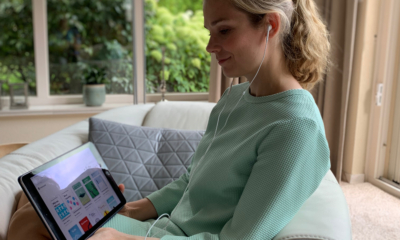The Digital Diet: A Doable Alternative to a Digital Detox

Be careful of your thoughts, for your thoughts become your words.
Be careful of your words, for your words become your actions.
Be careful of your actions, for your actions become your habits.
Be careful of your habits, for your habits become your character.
Be careful of your character, for your character becomes your destiny.— Chinese proverb
In recent years, we’ve learned to be selective about what we put into our bodies. After all, “we are what we eat”, and the food we consume forms the building blocks of our bodies and health. But how many of us ever stop to think about our mental diet – what we feed our minds every day?
Like the Chinese proverb above explains, we are shaped by our thoughts, feelings and beliefs. When you’re scared, angry, excited or in love, those thoughts and emotions trigger the release of specific neurotransmitters. These chemical messengers tell your body how to respond to the situation at hand – freeze, fight, flight, make love.
Much of the time, your thoughts cause temporary physiological changes, like that rush of dopamine you feel when you score a goal. But when something becomes a mental habit, like constant worrying or practicing gratitude every day, the patterns of neural activity sculpt your brain in more permanent ways. Busy regions in your brain will form new connections, which makes those neurological pathways stronger and more receptive to that specific mix of neurochemicals.
What’s more, what you repeatedly think shapes your deepest beliefs about yourself and the world. Your beliefs steer your actions, and regular actions become the habits that mold your daily life and (in part) your health.
That’s why a thought isn’t just a thought – it has the power to transform your life.
But your thoughts usually don’t appear out of nowhere. They don’t exist in a vacuum either. Your ideas, intentions, opinions, feelings and worries are sparked by the available input around you. The magazines you’re reading, the articles you’re browsing online and the TV shows you watch every week, they all have an impact on your thought patterns, mood, brain chemistry and corresponding physiological reactions.
And now that we’re bombarded with more information than ever before in history, it’s become even more important to mind your mental diet. But in a world filled with both chocolate bars and brain candy, what does a healthy mental diet look like? How can you nourish your mind with ‘nutrient-rich input’ and consume less ‘empty mental calories’?
What’s the nutritional value of your mental diet? Just like with food, mental input can be divided into two groups: ‘virtual vitamins’ and ‘empty-calorie brain candy’.
Now let’s be honest: we all consume our fair share of mental junk food. Like most of us, you probably mindlessly scroll through your social media feeds when you have a spare moment, read gossip magazines or binge-watch shows of questionable quality. Of course there’s nothing wrong with having guilty pleasures of entertainment. But unknowingly, the information you absorb can do more harm than you might think, like the downsides of social media and the problems around violent video games.
But it isn’t just the quality of your mental diet you should be concerned about, the quantity matters too. According to ‘The Organized Mind: Thinking Straight in the Age of Digital Overload’, the average American was bombarded with 5 times more information in 2011 than they were in 1986. Even worse, the average young person is exposed to more than 3000 ads per day on television, the Internet, billboards and in magazines.
Obviously, your brain has not evolved over the past decades to keep up with this explosion of information. And with on-demand entertainment within your reach 24 hours a day, it’s even more challenging to not be overloaded and overwhelmed.
With all this in mind, how can you create and stick to a mindful mental diet?
Have a look at these 5 questions to help you decide how much and what kind of mental input you want to consume.

The first step to a healthy mental diet is to become aware of what you fill your mind with. How does the information you consume all day long affect your thoughts and your mood?
Do you get agitated from reading heated online discussions in the comment sections? Are you hiding under the covers because that horror movie scared you more than you dare to admit? Do you feel that sneaky dopamine hit when you hear a message ping on your phone?
When you start paying attention to how different elements of your mental diet affect you, you might notice that checking Facebook doesn’t make you feel connected with friends, but gives you FOMO. Or maybe watching late night shows fire you up, which may not be convenient when you need to wind down for a good night’s sleep.
It all starts with realizing how the mental input available makes you feel, and whether that’s how you want to feel.
Which types of information and entertainment enrich your life? What adds value or ‘sparks joy’, to paraphrase Marie Kondo?
There’s a tremendous amount of resources available, both online and through physical products, from inspiring blogs, educational podcasts and online courses to moving movies or feel-good books. No matter what kind of mental input you enjoy, do you consume enough of it to fuel you?
Let’s not be snobs here. It’s perfectly ok to have guilty pleasures, just be aware of how and when you enjoy them. Don’t scroll through your social media feeds out of boredom when what really would lift your spirits is watching an episode of Scandal/Say Yes to the Dress/Top Gear.
Remember the 80/20 rule of healthy eating? If you eat wholesome ingredients 80% of the time, it’s fine to indulge yourself with sweets and snacks the remaining 20% of the time. Well, you could apply the same principle to your mental diet. When you mostly nourish your mind with valuable information and entertainment, there’s no harm in playing video games for hours straight on a rainy weekend.
Just make sure you don’t overlook activities you used to love in favor of easy online entertainment. When you’re tired after a long day, it may be more tempting to lay back with your favorite series on Netflix than grabbing a book or playing chess. One isn’t better than the other, but don’t automatically discount your old hobbies, even if you’re chronically ill.
Not everyone’s nervous system reacts to stimuli the same way. For example, extroverts feel fired up and alive in situations with lots of people and activity, while the nervous system of introverts gets easily overstimulated by the same input. Introverts usually need some quietude and alone time to recharge, whereas extroverts feel their best after socializing and having fun.
What’s a comfortable level of stimulation for you? Which type of mental input recharges you and which kind drains you?
Now that you’ve become aware of the mental input around you and analyzed your current mental diet, it’s time for the second step: crowding out the mental junk food and adding more virtual vitamins.
In the next post I will show you 28 ways to nourish your mind in a healthy way.
Do you mind your mental diet? What are your virtual vitamins and brain candy?
If you enjoyed reading this article, you might also like Why You Need a Digital Detox and 8 Ways to Unplug and 13 Thoughts on Healthy Social Media Use with Chronic Illness. For more positive input, check out Bibliotherapy: How Reading Fiction Can Help You Feel Better.